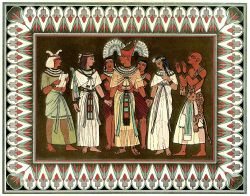Difference between revisions of "Category:Asenath (subject)"
| Line 6: | Line 6: | ||
== Overview== | == Overview== | ||
The story of the marriage between [[Joseph]] and Asenath is told in the [[Book of Genesis]] (41:45, 41:50-52). | |||
In Hellenistic times, the story is elaborated in a novel, [[Joseph and Asenath]] (see [http://markgoodacre.org/aseneth/translat.htm online text]), where at the center is now the conversion of Asenath to Judaism and her relationship with the other members of Joseph's family. There, Asenath is a virgin who rejects several worthy suitors in favor of Joseph, but Joseph will not have a pagan for a wife. She locks herself in a tower and rejects her idolatry in favor of Joseph's God and receives a visit from an angel who accepts her conversion. Joseph now consents to marry her. She bears him their sons Manasseh and Ephraim. Pharaoh's son wants Asenath for himself, however, and with the aid of Joseph's brothers Dan and Gad, he conspires to kill her husband. The loyal brother Benjamin interferes, and Pharaoh's son is ultimately slain. Asenath forgives the conspirators, and she and Joseph rule over Egypt for 48 years, after which they pass the crown to Pharaoh's grandson. | |||
==Asenath in ancient sources== | ==Asenath in ancient sources== | ||
Genesis 41 -- 45 Pharaoh gave Joseph the name Zaphenath-paneah; and he gave him Asenath daughter of Potiphera, priest of On, as his wife. Thus Joseph gained authority over the land of Egypt. 46 Joseph was thirty years old when he entered the service of Pharaoh king of Egypt. And Joseph went out from the presence of Pharaoh, and went through all the land of Egypt. ... 50 Before the years of famine came, Joseph had two sons, whom Asenath daughter of Potiphera, priest of On, bore to him. 51 Joseph named the firstborn Manasseh, "For," he said, "God has made me forget all my hardship and all my father's house." 52 The second he named Ephraim, "For God has made me fruitful in the land of my misfortunes." | |||
Joseph and Asenath -- | |||
* [[Asenath (sources)]] -- survey of ancient sources | * [[Asenath (sources)]] -- survey of ancient sources | ||
Revision as of 11:01, 17 January 2018
According to Jewish traditions, 'Asenath, the daughter of the Egyptian priest Potipherah, was the wife of Joseph. Their two sons were Manasseh and Ephraim.
Overview
The story of the marriage between Joseph and Asenath is told in the Book of Genesis (41:45, 41:50-52).
In Hellenistic times, the story is elaborated in a novel, Joseph and Asenath (see online text), where at the center is now the conversion of Asenath to Judaism and her relationship with the other members of Joseph's family. There, Asenath is a virgin who rejects several worthy suitors in favor of Joseph, but Joseph will not have a pagan for a wife. She locks herself in a tower and rejects her idolatry in favor of Joseph's God and receives a visit from an angel who accepts her conversion. Joseph now consents to marry her. She bears him their sons Manasseh and Ephraim. Pharaoh's son wants Asenath for himself, however, and with the aid of Joseph's brothers Dan and Gad, he conspires to kill her husband. The loyal brother Benjamin interferes, and Pharaoh's son is ultimately slain. Asenath forgives the conspirators, and she and Joseph rule over Egypt for 48 years, after which they pass the crown to Pharaoh's grandson.
Asenath in ancient sources
Genesis 41 -- 45 Pharaoh gave Joseph the name Zaphenath-paneah; and he gave him Asenath daughter of Potiphera, priest of On, as his wife. Thus Joseph gained authority over the land of Egypt. 46 Joseph was thirty years old when he entered the service of Pharaoh king of Egypt. And Joseph went out from the presence of Pharaoh, and went through all the land of Egypt. ... 50 Before the years of famine came, Joseph had two sons, whom Asenath daughter of Potiphera, priest of On, bore to him. 51 Joseph named the firstborn Manasseh, "For," he said, "God has made me forget all my hardship and all my father's house." 52 The second he named Ephraim, "For God has made me fruitful in the land of my misfortunes."
Joseph and Asenath --
- Asenath (sources) -- survey of ancient sources
Asenath in literature & the arts
- Asenath (arts) -- survey of fictional works
Asenath in scholarship
- Asenath (research) -- survey of scholarly works
External links
This category currently contains no pages or media.
